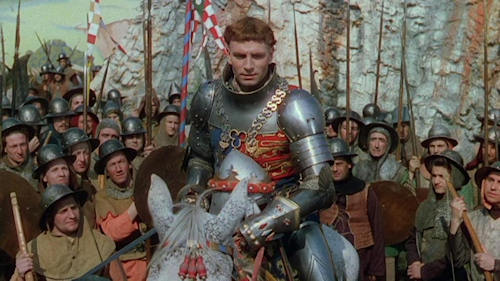Cry God for Harry, England..but Cut the Maths!
The curious case of the missing maths in Henry V movies
29 August 2025
"O for a Muse of fire, that would ascend
The brightest heaven of invention."
So begins the Prologue of Henry V, the stirring Shakespeare play that recreates the heroic victory of England's King Henry V over the bigger French army in the Battle of Agincourt.
The play has been made into two highly-acclaimed movies, first by Laurence Olivier in 1944, and then by Kenneth Branagh in 1989. The play opens with a character called the Chorus, who invites the audience to use their imagination to recreate the giant armies that took part in the great battle. And to do this, Shakespeare uses some mathematical metaphors.

Now we all know that when filming a play, directors often decide to make cuts to keep the script suitably punchy for a modern audience. But of all the cuts that Olivier and Branagh decided to make to Shakespeare's prologue, why did they decide to axe the maths?
As I mentioned, the Chorus character asks the audience to use their imagination. The small handful of actors on the stage will be representing an army of a million, but that's OK, all the audience needs to do is think of the Chorus as the digit 1 ('a crooked figure') and the other actors as zeroes ('ciphers') and bobs-your-uncle they make 1000000, which is a million. Or as Shakespeare puts it:
"...Since a crooked figure may
Attest in little place a million
And let us ciphers to this great accompt..."
And what do Olivier and Branagh do with this little nod to the beautiful idea of place value enabling you to turn 1 into a million? Both of them cut the first two lines completely, and Olivier cuts the third line too!
Later in the speech, Shakespeare reinforces the mathematical symbolism by asking the audience to divide each man into a thousand parts to give each man a thousand times more power in their imagination. In the words of the Chorus:
"Into a thousand parts divide on man
And make imaginary puissance"
And the two movies? They delete these lines as well.
To be fair, both directors do trim a couple of other lines too. But is it a coincidence that both directors chose to cut the maths? Or does it betray a deeper discomfort, the age-old habit of the arts avoiding mathematics, as if numbers can’t be poetic? Shakespeare clearly thought otherwise. Perhaps it’s time we did too.
1 of 34 Older

